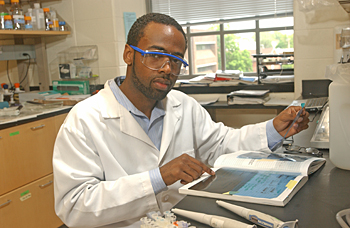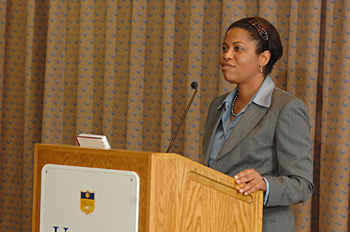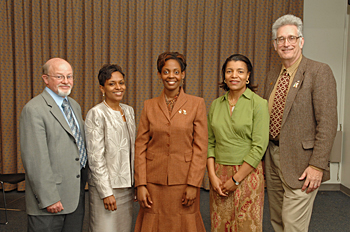
Click here to see what alums say about the NUCLEUS program.
“If you believe in your students and expect them to achieve great things...they always do.” --Victoria Orner, first coordinator of UD's NUCLEUS program
2:30 p.m., May 16, 2008--Cy Wilkins, CHS '06, learned about the NUCLEUS program as a freshman in 2002 when the program awarded him a scholarship to participate in UD's Summer Enrichment Program. By the time he reached his sophomore year, he needed no encouragement to stay in NUCLEUS. “I met a lot of NUCLEUS members who gave me advice and showed me the perks of being a part of the program. So, I was more than eager to join when classes started in the fall.”
Wilkins, who says he's interested in several medical specialities, is attending Jefferson Medical College in Philadelphia. While it was his own self-determination and hard work that put him on the road to success, he credits NUCLEUS for giving him the support and tools that paved the way.
“Without NUCLEUS I would have been lost and ill-equipped to deal with the challenge of getting into medical school....Medical school is a daunting task if you aren't a genius. NUCLEUS provided me with a game plan, offered tactics and refined my strategies to achieve my goals,” Wilkins said.
NUCLEUS, or Network of Undergraduate Collaborative Experiences for Underrepresented Scholars, has been helping students like Wilkins reach their academic and life goals since 1993, and this year, it celebrated its 15th anniversary with a banquet on April 27, attended by about 130 current and past students, faculty, staff and family members. Marijka A. Grey, M.D., AS '99, a NUCLEUS alumna, gave the keynote address.
NUCLEUS' reason for being is “to recruit, retain and graduate academically talented African-American, Latino, Native-American and Asian students majoring in science disciplines and increase the ethnic representation and cultural diversity in the sciences, while providing an environment that encourages academic achievement, leadership and service.”
The program is interdepartmental and administered by the College of Arts and Sciences. For the past 15 years, it has been entirely funded by the Howard Hughes Medical Institute's (HHMI) Undergraduate Biological Sciences Education Initiative. NUCLEUS recently received its fourth HHMI grant, funding it through 2010.
Harold White, professor of chemistry and biochemistry, directs the University's HHMI program that oversees NUCLEUS.
“It is often difficult to be an undergraduate member of an underrepresented group at a majority institution like UD. NUCLEUS has provided a home on campus for its students where they can be advised, mentored and find support,” White said.
During the 2006-07 academic year, 197 students were affiliated with the NUCLEUS program. Sixty-three percent of its students were African American, 10 percent Hispanic, 14 percent Asian, 3 percent Indian, 7 percent Caucasian and 3 percent other ethnicities. Just over 70 percent were female, 29 percent male. Of those, 63 NUCLEUS students were on the Dean's List and another 32 earned a GPA of 3.0-3.32.

Victoria Orner was the first NUCLEUS coordinator recruited by Philip A. Gottlieb, then assistant professor of chemistry and biochemistry and principal investigator for the grant. Orner previously had been academic adviser for the Utah State University College of Humanities, Art and Social Sciences and directing minority and special programs for the College of Science.
Orner said there were several things she wanted NUCLEUS to do.
First--give students a realistic expectation of what they would have to do to get into graduate school. “I also wanted it to be a resource center to help them successfully cross what can seem a 'mine field' of the applications process to enter into those fields and careers. In addition, Orner said she wanted the program to help them reinforce their “core motivations and belief systems” so they could tough it out during hard lonely times.
“Lastly, I wanted the program to gain national exposure for guiding other institutions to increase the numbers of ethnic minorities in the science/biomedical professions and to help faculty directors receive continued funding support,” she said.
Orner achieved all of her goals, and when she moved on four years later, NUCLEUS had touched the lives and careers of more than 200 students.
In 1998, White and David Usher, associate professor of biological sciences, took over leadership of the HHMI program, and Cheri Dotson, who received a bachelor's degree in chemistry from Spelman College and doctorate in inorganic chemistry from the University of Michigan, became NUCLEUS coordinator.
Dotson saw between 150-220 students through the program in the seven years she served as coordinator and even though she has taken a position at the University of Michigan as Student Affairs Program Manager for Graduate Student Recruitment & Outreach in the College of Pharmacy, she said she still has strong feelings for and ties to NUCLEUS.
“The last class of students with whom I interacted will be graduating this year, and I am excited about returning to wish the students in the class of 2008 a fond farewell as part of the 15th anniversary celebration of NUCLEUS,” Dotson said.
Zakiya Wilson served as NUCLEUS coordinator from 2005 into 2006, until she returned to Louisiana State University to be a graduate coordinator its Department of Chemistry. Jacqueline Aldridge assumed the post in 2006. Aldridge came from the National Institute of Health's Bridges program at Delaware Technical and Community College. The transition was a natural one since NUCLEUS and Bridges work closely together.

As NUCLEUS coordinator, Aldridge counsels, advises, mentors, helps find tutoring, provides comprehensive academic enrichment services, leadership opportunities and professional development opportunites. In addition, she travels to graduate schools across the nation, conferring with deans, program coordinators and managers and faculty members extolling the achievements of her students, paving the way for their applications to each institution.
When NUCLEUS coordinators talk about the program, they do so with a pride and fondness that is unmistakable, and the same is true for its students.
Candice Tolud, AS '03, now a student at the University of Pennsylvania School of Optometry, said NUCLEUS helped her “adjust to being a minority in the science field. By having a common meeting place for all minorities in the sciences, it allows underclassmen to have mentors to look up to and help with advice, study tactics and how to avoid the mistakes that they made. It is definitely a wonderful way to help incoming freshmen keep their heads above water,” she said.
“NUCLEUS has a strong support system that strengthens students mentally about the many challenges that await them,” said Obi Mmagu, a senior. His goal is to become a medical oncologist.
“This program was essential to me while at UD. I do believe that NUCLEUS is the reason that I am in graduate school fulfilling my career goals,” Nicole Barkley '06, now a doctoral student in biological sciences at University of Maryland, Baltimore County.
Jessica Bruton, a junior whose goal is to become a doctor, said, “NUCLEUS was my support system that helped me succeed in my classes. It's my UD family.”
Article by Barbara Garrison
Photos by Kathy Atkinson

